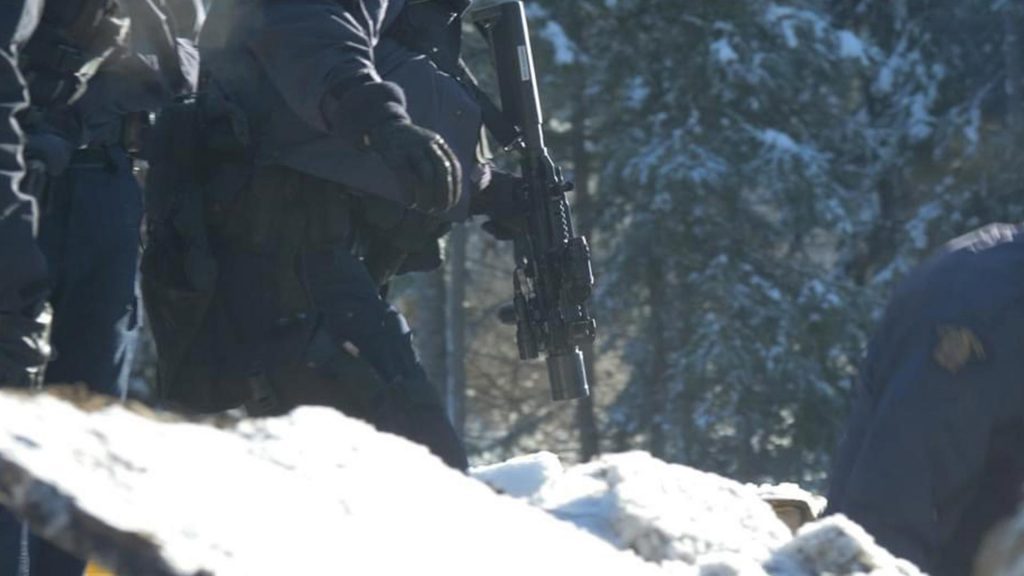
RCMP officers converged to dismantle Wet'suwet'en-led resistance camps for the third straight year on Nov. 18, 2021. Photo: Dan Loan/Twitter
The British Columbia government authorized emergency RCMP redeployment to Wet’suwet’en territory on the same day catastrophic floods ravaged critical infrastructure and deluged communities elsewhere in the province.
Solicitor General Mike Farnworth approved a request for more Mounties under Article 9.1 of the Provincial Police Service Agreement on Nov. 15, which was the same day the request came in, according to a statement provided to APTN News.
“A request to ensure appropriate levels of staffing like this from the RCMP is not something that government can turn down given the statutory requirement to ensure adequate policing,” said the statement attributed to B.C.’s Ministry of Public Safety.
On that same day, at 4 p.m. local time, Farnworth condemned blockades mounted by Wet’suwet’en hereditary chiefs and supporters who oppose construction of the Coastal GasLink pipeline through the nation’s unceded territory.
“Our government is concerned about the health, safety and well-being of those workers as the obstructions on the roads prevent access in and out of the worksites,” the statement said. “The right to protest does not extend to criminal actions.”
Two days later, now with the greenlight from B.C. to redeploy, a planeload of Mounties landed at the Smithers airport, according to the Gidimt’en Checkpoint twitter account.
“Police loaded onto two buses and unmarked, rental pick-up trucks and headed out towards the yintah (territory),” the checkpoint reported. “An RCMP helicopter is reported to be heading to the area.”
Police loaded onto two buses and unmarked, rental pick-up trucks and headed out towards the yintah. An RCMP helicopter is reported to be heading to the area.
Throughout today, helicopters have circled over our camps, conducting low, deliberate flights for surveillance.
— Gidimt’en Checkpoint (@Gidimten) November 17, 2021
A two-day militarized raid to break up blockades and dismantle resistance camps began 24 hours later. The force deployed tactical units armed with assault rifles and snipers alongside arrest teams, canine units and the chopper.
Mounties used an axe and chainsaw to hack through a wooden door on a tiny home filled with people on day two. Twenty-nine people were arrested during the crackdown, among them a photojournalist and documentary maker who were the only ones to document the raid.
Advocacy and civil liberties organizations widely condemned both the timing and tactics of the show of force. It was the third consecutive year Farnworth approved the ask just prior to enforcement. The requests come in writing from the E Division commander, the province’s top cop.
Pursuant to Article 9.1, the solicitor general can authorize internal redeployment “to maintain law and order, keep the peace and protect the safety of persons, property or communities” during temporary emergencies.
Letters invoking the clause in 2019 have already been released through the provincial freedom of information system. The BC Civil Liberties Association released the second letter greenlighting the request prior to the 2020 raid.
Chief Supt. John Brewer, who planned the latest operation, confirmed in a previous an interview with APTN that Farnworth invoked the clause the third time.
He said the plan to open up the road was made before the extreme weather hit, adding that the force met its commitments to the flood response in any case.
Read more:
B.C. greenlit more Mounties on Wet’suwet’en territory before 3rd raid
Raids, racism and reconciliation: It’s time to ‘break up’ the RCMP says expert on N2N
In the aftermath, however, provincial and federal politicians tried to distance themselves from the operation, pointing the finger at each other and refusing to answer questions.
APTN contacted Farnworth’s office on Nov. 30, asking when and why the minister, who is also B.C.’s deputy premier, opted to approve the request.
The department declined to answer the questions, only saying in a statement that politicians don’t direct police and that Farnworth doesn’t view or authorize the raid plans.
“The RCMP makes Article 9.1 requests if needed to respond to a variety of events that may require a redeployment of resources, including wildfires and the current flooding,” the department said on Dec. 2.
APTN then asked the RCMP to confirm when they requested more resources and when the request was approved.
They too declined to respond, saying, “Given this is a Ministerial decision, we will defer to BC Government to make such disclosures.”
The ministry disclosed the date after APTN contacted it once again.
The fact is now clear that Farnworth declared an emergency over the defiance of a civil injunction in the north while extreme weather emergencies demolished infrastructure elsewhere, leaving at least four people dead and many more scrambling to evacuate.

Grand Chief Stewart Phillip, president of the Union of British Columbia Indian Chiefs, called it “a very insidious, underhanded move on the part of the provincial government” on APTN’s Nation to Nation last week.
“We’re deeply concerned with the current practice of the Horgan government to weaponize the use of injunctions to authorize these highly militaristic raids on Indigenous territory,” he said. “It does not bode well for the future of so-called reconciliation.”
Meanwhile, in the B.C. legislature Green MLA Adam Olsen accused the ruling New Democrats of misleading the public and blaming the conflict on internal Wet’suwet’en “disunity” rather than being accountable for Crown policy decisions.
The company holds provincial permits to build a 670-km fracked gas pipeline from northeastern B.C. to a $40-billion liquefaction megaproject in Kitimat on the coast.
Both B.C. and the company have signed benefit agreements with five of six Wet’suwet’en band councils but lack consent from hereditary chiefs representing the nation’s five clans and 13 houses.
“They would love for the public to believe that there’s nothing they could do about it. But I can’t stress this enough: They are entirely responsible for this,” said Olsen, a Tsartlip First Nation member, referring the B.C. government in a phone interview.
“They need to stop sending these issues to the courts and then enforcing them through the barrel of a gun, and they need to start diplomacy and take responsibility for the decisions that they make.”
Federal politicians also tried to distance themselves from the standoff. Indigenous Services Minister Patty Hajdu told APTN National News the dispute is between the province and the Wet’suwet’en.
But RCMP headquarters confirmed Mounties under Ottawa’s jurisdiction assigned to federal policing units in B.C. were deployed to help, though HQ declined to offer further information.
Federal Public Safety Minister Marco Mendicino also expressed concern over media arrests both on twitter and in the House of Commons.
APTN asked the minister’s office if he raised these concerns with Commissioner Brenda Lucki but a spokesperson declined to answer the question.
“While we cannot speak to operational policing matters we have been clear that the role of the RCMP is to uphold the law, ensure public safety and respect the rights of Canadians, including journalists,” said a statement supplied instead.
APTN followed up asking the same question, which Mendicino’s office again declined to answer.
Some NDP grassroots members are also pushing for the federal party to call out its B.C. counterpart. Three federal NDP MPs recently signed a petition denouncing the province’s handling of the dispute.









